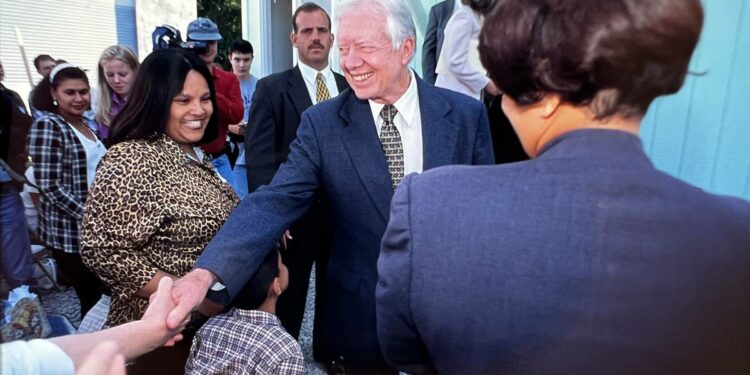Former President Jimmy Carter greets Habitat for Humanity-Anchorage volunteers prior to the dedication of a new home for Elizabeth Reyes, left, and her sons Kenneth and Kevin on Aug. 23, 2000 in Mountain View. Carter, accompanied by former first lady Rosalynn Carter, thanked his audience on behalf of the Reyes family. (Erik Hill / ADN archive)
Former U.S. President Jimmy Carter died Sunday at the age of 100, leaving a complicated legacy in resource-rich Alaska after he signed legislation that protected much of the state as national parks, refuges and wilderness.
After his death, praise from conservation leaders streamed in. Some of Alaska’s current and former political leaders also expressed their respect for Carter, though some were quick to point out that they hold different political views.
Former U.S. Sen. Mark Begich, a Democrat like Carter, said that Alaskans’ views of Carter’s legacy will be “mixed.”
“On some of the conservation issues, he did a good job, and on some he maybe locked up Alaska a little too much,” Begich said.
Carter’s efforts at brokering peace deals and supporting humanitarian services, decades after he had left office, illustrated his commitment to others, Begich said.
“What he symbolized, I think, was true public service,” he said.
Carter called his greatest domestic achievement the 1980 Alaska National Interest Lands Conservation Act. It doubled the size of the national park and refuge systems, protected 25 wild rivers and classified 56 million acres of Alaska as wilderness. It led to federal protection of rural subsistence hunting and fishing, as well.
[Jimmy Carter shaped modern Alaska in profound, lasting ways]
But it also set the stage in Alaska for complicated battles over land and resources that have long frustrated political leaders in Alaska, who have fought to open remote areas such as the Arctic National Wildlife Refuge for oil drilling, or swaths of the Northwest Arctic to build a 200-mile road for mining.
Alaska Republican U.S. Sen. Dan Sullivan said on social media said he appreciated Carter’s work on Middle East peace and other issues. But he distanced himself from the former president on Alaska issues.
“Regardless of our significant political differences about Alaska and the critical importance of a strong U.S. military, I appreciated President Carter’s devotion to faith, family, service to others and Middle East peace,” Sullivan said. “I also have deep respect for his service to our country in the U.S. Navy where he was involved in the development of our country’s first nuclear submarine. Julie and I are praying for his family during this time of mourning.”
Alaska U.S. Rep.-elect Nick Begich III, a Republican and the nephew of Mark Begich, also distinguished his views from Carter while commending his legacy.
“While our political perspectives were quite different, President Carter dedicated his post-presidential service to the pursuit of peace and free democratic elections in the developing world, both causes deeply worthy of pursuit,” Rep.-elect Begich said in a text message. “He had a true heart for humanity, and reminded us that we can passionately disagree while also sincerely caring for one another.”
The differences have to do with Carter’s work to set aside so much land in Alaska, adding to development challenges, Rep.-elect Begich said.
“An enumeration of our differences in this moment would distract from the opportunity to honor his many years of service,” Rep.-elect Begich said. “The discussion regarding responsibly opening Alaska continues on January 3rd in the 119th Congress.”
Democratic former Gov. Tony Knowles said he considers the Alaska land conservation act to be Carter’s greatest achievement for the state and the nation.
![]()
The parks, refuges and other areas are open to everyone for their enjoyment, an “incredibly unique” gift to the world, he said.
They are not locked up, Knowles asserted — they support tourism, a critical part of the state’s economy, as well as subsistence hunting and fishing.
“It permanently, for future generations, protected the national resources for our own economy, culture and food on the table for Alaskans,” Knowles said. “It wasn’t easy, and in Alaska, where there are often many more opinions than people, there were many policy battles involving all sides. But in looking back, I think that we can all agree what Jimmy Carter did has served us all and future generations well.”
Carter also left a legacy of caring for others, Knowles said.
“To millions of people around the world, he was truly a person of compassion, care and courage,” he said. “From president of America to being a carpenter building homes for those without homes, to teaching Sunday school every Sunday, he never stopped serving others and helping them have a better life.”
Some members of Alaska’s Republican leadership were straightforward in their praise of Carter.
“President Jimmy Carter will be remembered for his service to our nation and his post-presidency dedication to humanitarian efforts across the globe,” U.S. Sen. Lisa Murkowski said in a statement on social media. “He led a remarkable life and left a legacy of peace. My prayers are with President Carter’s family and loved ones.”
“Former President Jimmy Carter’s commitment to human rights and democracy made a difference in the lives of countless people across the globe, and inspired many others to follow in his footsteps,” Gov. Mike Dunleavy said in a social media statement. “He came from humble beginnings in rural Georgia and reached the pinnacle of American politics. His 100 years on this earth had purpose and meaning, and he was deeply committed to his faith, family and our country. Rose and I extend our sincere condolences to his family and friends around the world.”
The office of outgoing Democratic U.S. Rep. Mary Peltola did not immediately respond to a request for comment, and hadn’t yet commented on Carter’s death on social media as of Monday afternoon.
Former Democratic Sen. Begich said beyond Carter’s more well-known impacts in Alaska and beyond, the president also deregulated trucking, aviation and other industries in ways that improved travel and shipping to Alaska and elsewhere, among other important actions.
“People remember more of his conservation issues that impacted Alaska, but when you think of all that everyday stuff regarding deregulation and what it did to create competition and pricing from freight to transportation to shipping, all of that had a direct impact to everyday people all across the country,” he said.
Environmental groups remembered Carter for his strong conservation stance. In 1978, Carter used the Antiquities Act to protect 56 million acres of Alaska’s wilderness. The action helped lead to passage of the Alaska lands conservation act that expanded the U.S. conservation system by an area the size of California.
The Alaska Conservation Foundation said in a statement that the organization “owes its very inception” to the act’s passage. Carter was the group’s honorary board of trustees chair.
“His impassioned advocacy served as a guiding force to continue protecting our state’s ecological diversity and cultural richness,” said Michael Barber, the group’s president. “As we mourn his passing, we commit to future generations to uphold his legacy by protecting Alaska’s unmatched, intact, large landscapes.”
The Alaska Wilderness League said the former president will continue to serve as a “guiding beacon” for environmentalists.
“As an honorary co-chair of the League’s Board of Directors, Carter’s commitment to protecting lands, waters, and wildlife paved the way for conservation on an unprecedented scale. His efforts remain a cornerstone of environmental protection today,” said Kristen Miller, executive director at Alaska Wilderness League.
The group said Carter’s legacy in protecting the Arctic National Wildlife Refuge faces new threats from potential oil and gas drilling.
The group said it would recommit itself to protect the refuge and other important areas that could see increased chance of development after President-elect Donald Trump begins a second term in January.
Republicans in 2017 during Trump’s first term passed a law requiring lease sales, and potential oil and gas drilling, in the Arctic refuge. The first lease sale under Trump saw little interest from bidders, but a second lease sale is scheduled for Jan. 9.
Trump has vowed to allow drilling in the refuge.
He mourned Carter’s passing on Truth Social, his social media platform, but also highlighted their differences.
“President Jimmy Carter is dead at 100 years of age,” Trump wrote. “While I strongly disagreed with him philosophically and politically, I also realized that he truly loved and respected our Country, and all it stands for. He worked hard to make America a better place, and for that I give him my highest respect. He was a truly good man and, of course, will be greatly missed. He was also very consequential, far more than most Presidents, after he left the Oval Office. Warmest condolences from Melania and I to his wonderful family!”
Source link : http://www.bing.com/news/apiclick.aspx?ref=FexRss&aid=&tid=6773423ccfea4aee86a8eaf0a10b13c0&url=https%3A%2F%2Fwww.adn.com%2Fpolitics%2F2024%2F12%2F30%2Falaska-leaders-praise-jimmy-carter-while-some-also-underscore-political-differences%2F&c=3615887694230760558&mkt=en-us
Author :
Publish date : 2024-12-30 11:10:00
Copyright for syndicated content belongs to the linked Source.












